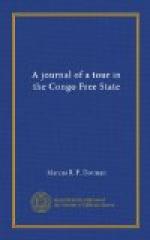On August 5th the Flandre proceeds up the river, and we bid farewell to our travelling companions, who seem to have become old friends in the last six weeks. Everyone, is always most kind and courteous, and not only gives every information, but also the benefit of his experience, and thus affords much valuable assistance. The town of Coquilhatville consists of rows of brick houses standing in their own gardens and fronting on avenues. It may seem that one insists unnecessarily on the fact that the houses are brick in all the towns, a fact which the European would accept as a matter of course. The traveller however knows that in most tropical countries, wood is usually employed instead, as being easier to obtain and work. Indeed in the United States, the country seats of even the very wealthy are generally constructed chiefly of that substance. Bricks however, are by no means easily made in the Congo, for in many places the soil is very sandy and it is therefore difficult to make the brick bind. Again, lime is very scarce and all manner of substances are used to make mortar. Among these the ant hills are much in favour, for it has been observed that these structures which are often thirty feet high and in proportion great in diameter, never disintegrate in the heaviest rain. When dug out and mixed with sand their substance makes an excellent mortar. Again, the shells of oysters, which abound in some parts of the river are also used to make mortar with good results. The roofs are thatched with palm leaves wherever obtainable, and if well constructed are quite water tight. Glass windows are not much used, for as much air as possible is desirable and the verandahs are so broad that rain rarely enters. The openings are thus closed only by shutters or by wire gauze to keep out the numerous insects.
Living here is very expensive. The usual money is the mitako, but the native likes salt and will sometimes take cloth if he fancies it. He is however, very independent, and on one occasion a native refused 14/- in cloth for a single duck. Fowls and eggs are about the same price as in the West End of London, but the latter are very scarce. Fruit is however, cheap, as it is abundant. Near the town is a large coffee and cocoa plantation arranged in square fields, separated by avenues of palms, which both form grateful shade and yield much palm oil. On each field is a large board on which is painted the number of bushes. Papye, coeur de boeuf, bananas and pineapples abound.
The system of work in every Post is exactly the same, so that a description of it as witnessed in Coquilhatville would equally do for every place in the Congo. At 5.30 a.m. reveille and at 6 a.m. roll call of all the Europeans and native workers who then, led by a bugler, march off to their respective duties. At 11.15 a.m. bugle call and all the natives march to the river and bathe. At 11.30 a.m. bathing ceases and they march off behind the bugler to dinner




